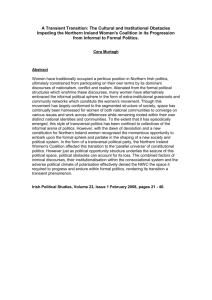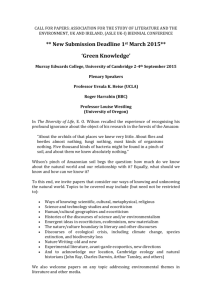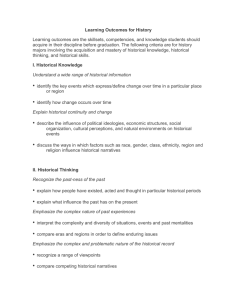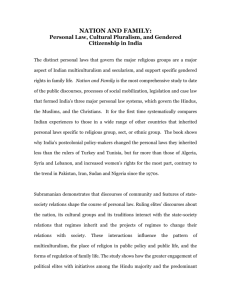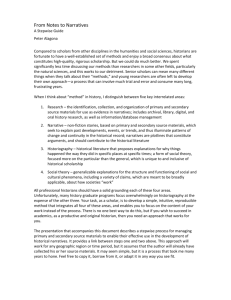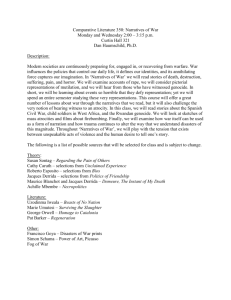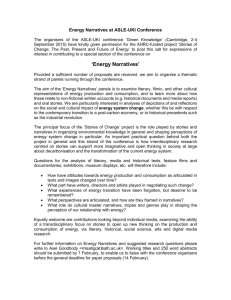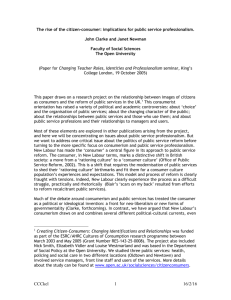Janet Newman
advertisement
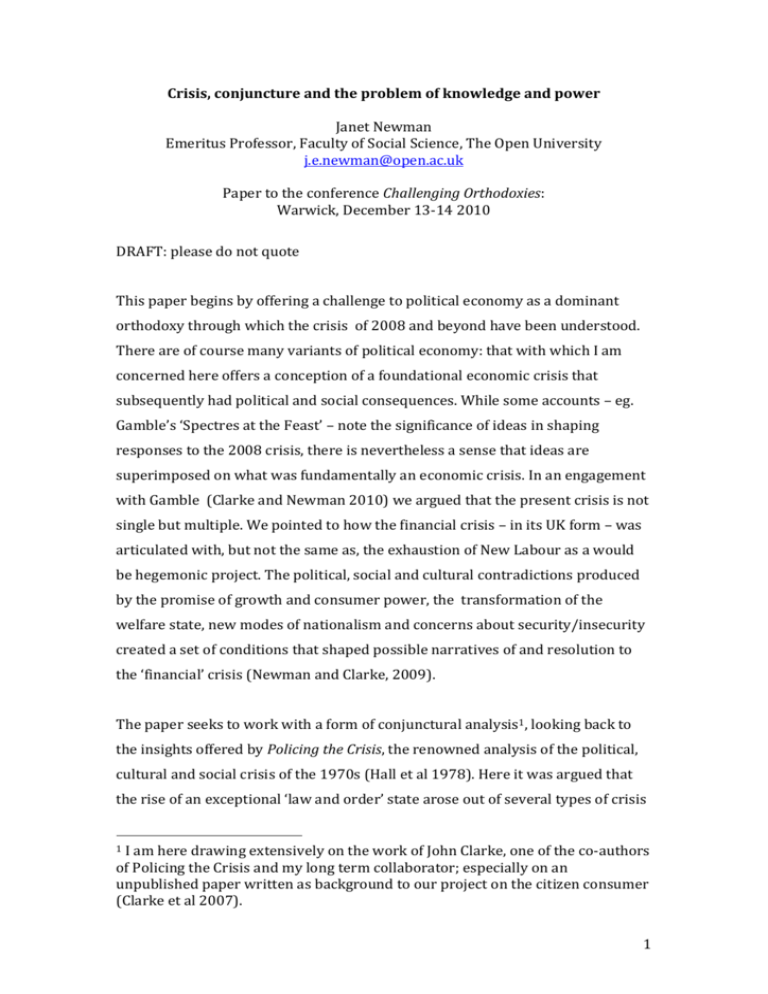
Crisis, conjuncture and the problem of knowledge and power Janet Newman Emeritus Professor, Faculty of Social Science, The Open University j.e.newman@open.ac.uk Paper to the conference Challenging Orthodoxies: Warwick, December 13-14 2010 DRAFT: please do not quote This paper begins by offering a challenge to political economy as a dominant orthodoxy through which the crisis of 2008 and beyond have been understood. There are of course many variants of political economy: that with which I am concerned here offers a conception of a foundational economic crisis that subsequently had political and social consequences. While some accounts – eg. Gamble’s ‘Spectres at the Feast’ – note the significance of ideas in shaping responses to the 2008 crisis, there is nevertheless a sense that ideas are superimposed on what was fundamentally an economic crisis. In an engagement with Gamble (Clarke and Newman 2010) we argued that the present crisis is not single but multiple. We pointed to how the financial crisis – in its UK form – was articulated with, but not the same as, the exhaustion of New Labour as a would be hegemonic project. The political, social and cultural contradictions produced by the promise of growth and consumer power, the transformation of the welfare state, new modes of nationalism and concerns about security/insecurity created a set of conditions that shaped possible narratives of and resolution to the ‘financial’ crisis (Newman and Clarke, 2009). The paper seeks to work with a form of conjunctural analysis1, looking back to the insights offered by Policing the Crisis, the renowned analysis of the political, cultural and social crisis of the 1970s (Hall et al 1978). Here it was argued that the rise of an exceptional ‘law and order’ state arose out of several types of crisis I am here drawing extensively on the work of John Clarke, one of the co-authors of Policing the Crisis and my long term collaborator; especially on an unpublished paper written as background to our project on the citizen consumer (Clarke et al 2007). 1 1 (economic, social, political and cultural) that came together in a crisis of hegemony or social authority. Conjunctures mark specific configurations of space and time in which multiple forces, tendencies, pressures and possibilities are combined. Conjunctural analysis, then, involves an open reading of how conjunctures are constituted, and how they are made to develop. Rather than an exclusive focus on reading dominant forces and pressures (whether of economy, class, discourse, governmentality) it understands the dominant as temporary, partial and contingent. The existence of other forces, interests and possibilities means that progress need not be linear, unidirectional or inevitable. The focus on multiplicity does not however substitute for attention to analysis of power. Political/governmental projects (Newman and Clarke, 2009) seek to direct the multiplicity of forces and tendencies, amplifying some and seeing to sideline others, selectively mobilizing and de-mobilising particular groups, and developing narratives that connect disparate elements. The discursive work of such narratives is to construct coherence of the present and make its development appear natural or organic. How can such an approach help us understand the present? First, it points to the need to focus on practices of representation and signification that seek to connect ideas, politics and popular thought and action. Here I want to draw attention to a range of discourses that are being articulated in ways that seek to create a coherent narrative of the current political direction of travel. These include traditional conservative discourses: of security, freedom, responsibility, and the perils of an overgrown and over-intrusive state. But attempts are being made to rework other discourses – fairness, deprivation, inequality and even ‘progressive’ – in ways that seek to change their meaning through new articulations. And we can trace emergent discourses doing important work to join up disparate elements: those of resilience, character and a whole set of ‘moral’ and relational qualities that might help constitute ‘happiness’. One way of understanding all this is to focus on new discursive articulations and narratives as a kind of ideological smokescreen. Such discourses and narratives 2 serve to mask the inequalities likely to arise as a direct result of the cuts and policy programme of the coalition government. They mask the likely redistribution of resources across differences of both class and gender. They mask the privileging of business interests, and the new spatial inequalities produced through the governance of austerity and security. They point to the subordination of other crises, whether of environment, climate change, care, public heath, or growing social and spatial inequality, to that of the economy. But the idea of an ideological smokescreen does not take us very far. As well as focus on practices of representation and signification I want to highlight practices of dialogic contestation. I want to make at least three points here. The first concerns the political dynamics of power and resistance. Certainly the narratives of crisis – and the successful redefinition from a banking crisis to a fiscal crisis, a debt crisis and then, within the UK, as a crisis of the very powerful and extended state that New Labour had produced - helped win Cameron support for a range of ‘austerity measures’. Such narratives have been hardly contested within governments or the media in the affluent North, and within the UK there is a surprising correspondence between Labour and Tory parties around the necessity of cuts. However for some groups the narratives appear not to be working very well. This is evidenced by new cycles of protest and dissent – whether by students on the streets or by organized policy communities (as in the successful bid for a judicial review of the coalition budget by the Fawcett Society). But such resistance can be viewed within, rather than outside, the successful purchase of dominant economic discourses: it takes place, that is, on a discursive terrain defined by the economic crisis. Students, women and others are calling for the restoration of what is being lost in economic terms rather than challenging the political or cultural architecture sustaining particular kinds of higher education or gendered orderings of power. Let me be clear: economics do matter and access to resources is an important area of struggle. My point is however that for both government and protestors the privileging of economic 3 vocabularies of justification within the new discursive orderings of knowledge and power has, it appears, been successful. The second point, in contrast, points to the ways in which the non-economic is being sutured into new articulations. The space for and significance of the Big Society, argues Bill Jordan (2010), were constituted by the absence of moral and relational aspirations in the New Labour project, a project that relied on an arsenal of transactional and quantitative performance measures to deliver ‘satisfaction’ with public services. Its failures, he suggests, opened the way for the Big Society as a key element of what Blond termed ‘Red Conservatism’. I want to extend this analysis by drawing attention to a host of think tank projects of the centre left/right that offer seemingly new solutions to old social problems: the prolific outpourings of the NEF, Demos, Civitas, the Young Foundation, the Centre for Social Justice and other sources of policy innovation, as well as the inclusion of policy advisers such as Thaler (‘nudgeanomics’) and Blond near the centre of government. These have important differences, but cohere around several common features: the significance of the (neglected) moral and relational architecture needed to sustain social policy outcomes; a focus on a search for solutions that do not rely on state funding or public services; and the presentation of new solutions as nonideological, ‘beyond’ left and right. These features clothe them with the organic and ‘natural’ sensibility needed to ensure the effectiveness of the hegemonic political narrative. Each also speaks to and draw on popular discontents with the New Labour project. My third point concerns the possible emergence of other – including counterdiscourses and projects. Green and environmental politics are obvious examples, though political concerns about and action on the environmental crisis have tended to be subordinated to the return to ‘growth’ as the aspiration of national governments (the discursive juxtapoisiton of austerity and prosperity in both the financial and business press offers as a way of legitimising present pain through the promise of future rewards). But we might also point to a range of 4 alternative economic and social projects (such as time banks, LETS schemes, the revival of the cooperative movement, the transition town movement) that currently operate on the margins but that offer alternative imaginings of how we might live. There is of course a danger of rosy tinted optimism about the possibility of alternative projects – these do not necessarily flow from progressive (in its pre Cameron/Blair meaning) social and political movements. For example the effectiveness of London Citizens in mobilizing new political voices depends on the rise of faith based and/or traditionally religious groups and their growing voice in British politics. This is of concern not only to those who view politics as a secular matter, but also to those disturbed by erasure of questions of sexuality, abortion, domestic violence, homosexuality and transgender issues from the political lexicon in the interests of forming and sustaining alliances between different faith and non faith groups (Dhaliwal, 2010). This represents a highly gendered redrawing of public and private realms and speaks uneasily to the remoralization of some areas of public and social policy. All of this raises the question of the vocabularies of justification that surround political movements and ideas (Boltanski and Thevenot, 1991, 2006). We might point to the attempted erasure of the vocabularies of justification of the welfare state ‘moment’ – those of needs, public action, equality, social justice. These were uneasily aligned, under New Labour, with vocabularies of business, the market, equity, choice and consumerism; and under the Coalition government these in turn were overlaid with vocabularies of freedom, fairness and responsibility. But what is interesting is the survival of popular vocabularies of justification (and of justice) derived from the welfare state moment. We need, then, to ask about the political and cultural effectivity of political discourses: do they draw on and speak to popular common sense? Do they summon people effectively? Do they succeed in connecting people to the polity, or do they produce cynicism and political disenchantment? 5 While some elements of contemporary discourses of power have gained purchase in popular culture, others have not. It would seem that popular attachment to the idea of the Big Society is neither large nor stable. In a recent Mori poll, 54% responded that it was a good idea in principle but was unlikely to work, while 57% agreed with the proposition that it was a smokescreen for cuts. Yet its relational and moral vocabularies may yet speak to elements of the popular that failed to be satisfied with the Benthamite rational pragmatism of New Labour. The idea of ‘fairness’ has important resonances with popular common sense, especially perhaps in Britain (public schools,, cricket, the wartime and post war acceptance of rationing) and the idea of fairness ‘for those who deserve it’ may speak successfully to those who see themselves as left behind by welfare spending on ‘undeserving’ welfare recipients. But it is also a vocabulary readily appropriate by those protesting against cuts or challenging specific policy or budgetary decisions (whether the Fawcett society securing judicial review of the 2010 budget, middle class parents protesting against the proposed curtailment of child benefit or young people demonstrating against proposed rise in tuition fees). Neither the power/resistance duality nor the governmentality emphasis on the constitution of subjects through discourse appear to capture such dynamics. Despite appearances, then, we are witnessing not a successful political project but a struggle for hegemony. A great deal of comment is occurring at the moment on which elements of the policy programme might succeed and which may be abandoned, and on the compromises that have already been secured. But we need to look beyond Whitehall and Westminster to assess how far the political project on which Cameron et al is embarked succeeds in establishing a new common sense orthodoxy. In analysis of the struggle over the next year or so attention needs to be paid to who is speaking (as will be evident from the preceding arguments, we cannot be satisfied with notions of ‘the state’ or ‘the government’ or even ‘protesters’ as singular voices) and who their speech is directed to (political constituencies such as red Tories, blue Tories, the centre ground; but also more abstract entities – business, the market, the disaffected, the media, churches, the US, and those old bêtes noires the professions and 6 public sector workers). Attention might also be paid to those not included in the desired social settlement and to absences in the narrative of movement towards a redefined ‘progressive’ future. Of course hegemonic projects are not necessarily successful: they have to be understood as projects in the making. But in tracing their progress, and the contradictions and consequences they give rise to on the way, it is important not to treat them as ideologies already consolidated and as power blocks sealed with the cement of consensus. This is not to deny the potency of ideologies nor of institutional power; but it is to argue for a space of politics whose dimensions are only now in the making. References Boltanski, L and Thevenot, L (1991 English trans 2006) On justificatino: economies of worth. Princeton University Press Clarke, J and Newman, J (2010) ‘Summoning specters: crisis and their construction’. Journal of Education Policy 25, 6, November: 709-715 Dhaliwal, S (2010) London Citizens and the Big Society. Paper presented at CCIG Forum, December 7 (www.open.ac.uk/ccig). Gamble, A (2009) The Spectre at the Feast: capitalist crisis and the politics of recession Basingstoke, Palgrave Macmillan. Hall, S et al (1978) Policing the Crisis: mugging, the state and law’n’order. London, Macmillan. Jordan, B (2010) Why the Third Way Failed. Newman, J and Clarke, J (2009) Publics, politics and power: changing the publics in public services. London, Sage. 7 8
